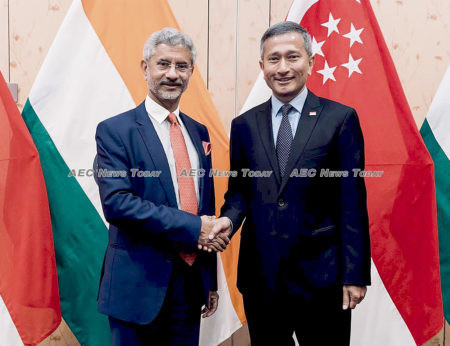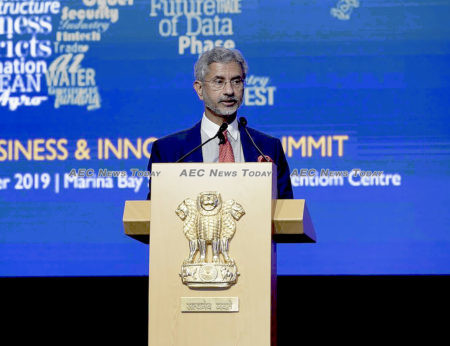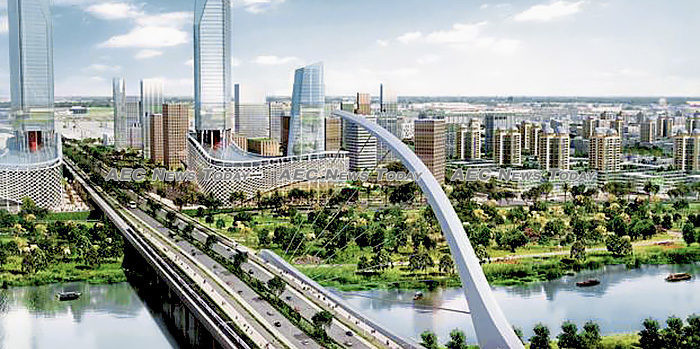Singapore foreign minister Vivian Balakrishnan on Monday (Sept 9) called on India to “honour the sanctity of contracts” signed with foreign partners in the first public signs of concern by the Asean member state over the fate of a speculated $2.8 billion sunk into developing Amravati, a new city off India’s eastern coast, by Singapore investors.

Some $16.2 billion in foreign investment poured in to India from Singapore last year, making it India’s largest foreign investor. Unsurprisingly, Singapore companies have shown strong interest in the construction of Amravati, a proposed futuristic metropolis designated as the capital of one of India’s newest states, Andhra Pradesh.
However, following the electoral rout in May of former state premier Chandrababu Naidu by the Yuvajana Sramika Rythu Congress Party (YSRP), development plans for the project have been being “reworked”, against a backdrop of slowing economic growth and allegations of over charging.
“All governments are entitled to review their plans. The investors will wait for the decisions to be made”, Mr Balakrishnan said, adding that investors “are [also] entitled to review their decisions”.
The pointed remarks came during a panel discussion during a two-day investment seminar organised by the Indian High Commission titled ‘Session of India Singapore: The Next Phase of Strategic Partnership’. The seminar and exhibition capped off a hectic six-day, two-nation trip to Indonesia and Singapore by India’s Minister for External Affairs, S Jaishankar.
While India and Singapore enjoy a close and friendly relationship it isn’t irritation free, Mr Balakrishnan making it clear that he felt that the bulk of the resistance to the proposed 16-nation Regional Comprehensive Economic Partnership Agreement (RCEP) was coming from India,
RCEP: Political benefits don’t outweigh economic merits
Acknowledging India’s cautious and pragmatic approach Mr Jaishankar said that the political benefits of agreeing to a trade deal shouldn’t be allowed to supersede the “economic merits”.

The former India high commissioner to Singapore and ambassador to Beijing went on to say that India’s ballooning trade deficit with China was a major concern keeping New Delhi from concluding the RCEP talks.
“China’s protectionist policies are playing out to the detriment of India in bilateral trade. We already have a bilateral free trade agreement with most Asean countries or with the bloc”, he said, adding that the lack of consensus on rules governing trade in services and labour were other sticking points for India.
Although the trade ministers of the RCEP countries met for the seventh round of talks in Bangkok over the weekend there has been little in terms of deliverables, despite negotiators setting themselves a year-end deadline.
China, currently Asean’s largest trading partner, has warned that it would back a deal without India if the south Asian country isn’t onboard by then.
During his stay in Singapore Mr Jaishankar co-chaired the sixth Joint Ministerial Committee (JMC) with Mr Balakrishnan, in addition to meeting with Singapore Prime Minister Lee Hsien Loong and other cabinet ministers.
Mr Jaishankar’s four-day visit to Singapore comes on the heels of a two-day trip to Indonesia, where India is developing its first deep-sea sea port in Southeast Asia. A key plank to India’s Indo-Pacific strategy, the Sabang port is part of the “Shared vision of maritime co-operation in the Indo-Pacific” agreed to by the leaders of the two countries last year.
Feature photo livemint
Related:
- Singapore a major economic partner in Modi’s second term, says Indian minister (The Straits Times)
- Why India is developing its maiden deep-sea port in Indonesia (The Times of India)
- Singapore urges India to join ‘game-changing’ trade pact (The Straits Times)
Dhairya
Latest posts by Dhairya (see all)
- Indonesia and India deal to reduce each others gluts, but not everyone is happy – September 18, 2019
- Amravati: Singapore urges India to honour “sanctity of contracts” during Jaishankar’s visit – September 10, 2019


